Winter canola yields attained superior levels at testing sites in Kansas in 2021. The primary reason for the high yields was ideal flowering and grain-filling temperatures during April and May. Dense canopies, filled with an abundance of seed pods and flowering late into the growing season, were witnessed at multiple locations. The high yields were obviously a positive outcome as we were reminded what the yield potential of winter canola can be when planting conditions are favorable, moisture is not limiting, and temperatures are cooler than normal during the reproductive stages.
Canola trials were seeded in fall 2020 into optimum soil moisture conditions following early September rainfall. After emergence, occasional showers throughout the fall set the crop up for optimal growth going into the winter months. Overall, winter temperatures were trending mild until the major cold snap in February. Drought conditions plagued trial sites in south central and southwest Kansas in the spring. In combination with the drought, a late April freeze also negatively affected yields. Yields in northern Kansas were the highest because rainfall amounts were greater.
It was anticipated that we would observe winterkill following the unprecedented cold snap; however, very little winterkill was recorded. This occurred because of a few reasons. First, the cold occurred during February when the crop was fully acclimated (its most winter hardy state) to withstand bitterly cold temperatures. If the cold would have occurred in November on a poorly acclimated crop, the results would have been much more devastating. Second, a blanket of snow helped protect the crop across much of the state. Three, the level of winter hardiness in today’s varieties continues to be elevated. Winter hardiness is affected by genetics, environment, and management; thus, all three play a factor in determining whether or not a variety will survive Kansas climatic conditions.
National Winter Canola Variety Trial (NWCVT) sites for the canola breeding program were harvested at Belleville, Colby (not yet reported), Garden City, Hutchinson, Manhattan, and Norwich. Each trial is split into open-pollinated (OP) and hybrid varieties. Yields in the OP and hybrid trials in Belleville averaged 79 and 91 bu/acre, respectively. For the first time in its history, the canola program harvested entries that yielded over 100 bu/acre at this site. The Garden City OP and hybrid trials averaged 43 and 47 bu/acre, respectively. The Hutchinson OP and hybrid trials averaged 60 and 67 bu/acre, respectively, and the Manhattan OP and hybrid trials each averaged 74 bu/acre, mostly because of timely spring rainfall and dense crop canopies. The Norwich site was the most drought stressed location and as a result the OP and hybrid yields were 42 and 45 bu/acre, respectively. Greater losses from the late April freeze were observed at this location as well.
NWCVT yields for Belleville and Manhattan (northern Kansas) are summarized for the OP and hybrid entries in Figures 1 and 2, respectively. Yields for Hutchinson and Norwich (south central Kansas) are summarized for the OP and hybrid entries in Figures 3 and 4, respectively. Yields for Garden City (southwest Kansas) are summarized for the OP and hybrid entries in Figures 5 and 6, respectively.
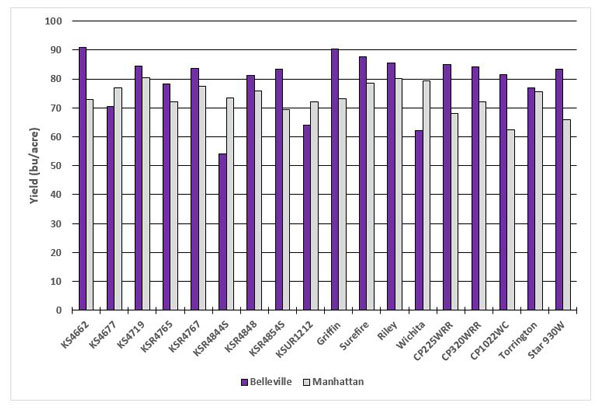
Figure 1. Yield results for northern Kansas (Belleville, Manhattan) OP variety trials. Belleville LSD (0.05) = 17 bu/acre; Manhattan LSD (0.2) = 7 bu/acre.
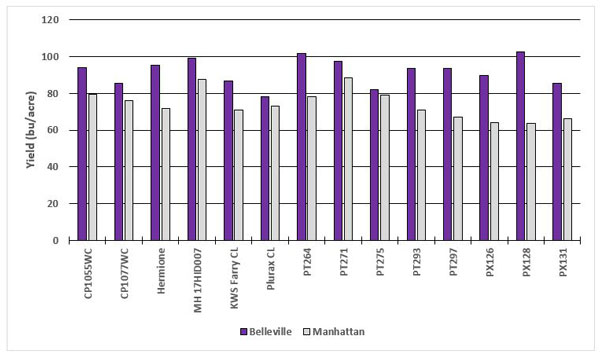
Figure 2. Yield results for northern Kansas (Belleville, Manhattan) hybrid variety trials. Belleville LSD (0.05) = 13 bu/acre; Manhattan LSD (0.05) = 9 bu/acre.
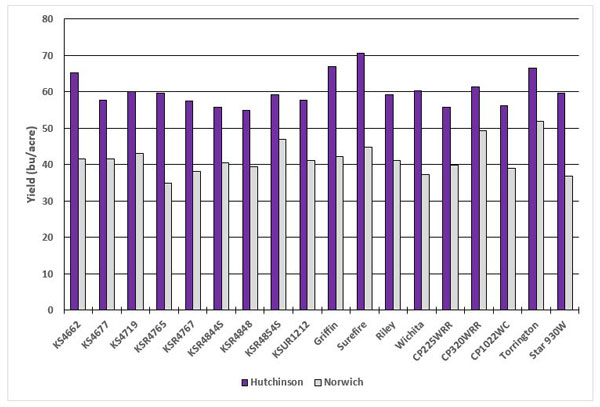
Figure 3. Yield results for south central Kansas (Hutchinson, Norwich) OP variety trials. Hutchinson = no significant difference; Norwich LSD (0.05) = 9 bu/acre.
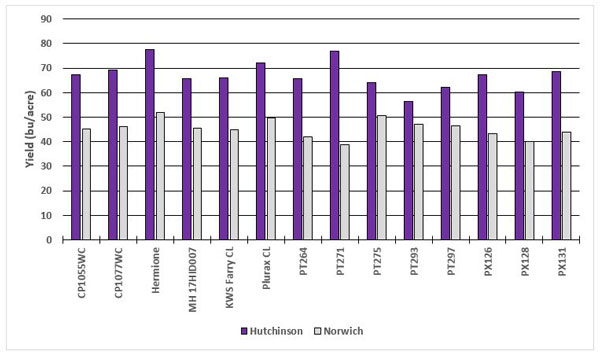
Figure 4. Yield results for south central Kansas (Hutchinson, Norwich) hybrid variety trials. Hutchinson LSD (0.3) = 7 bu/acre; Norwich = no significant difference.
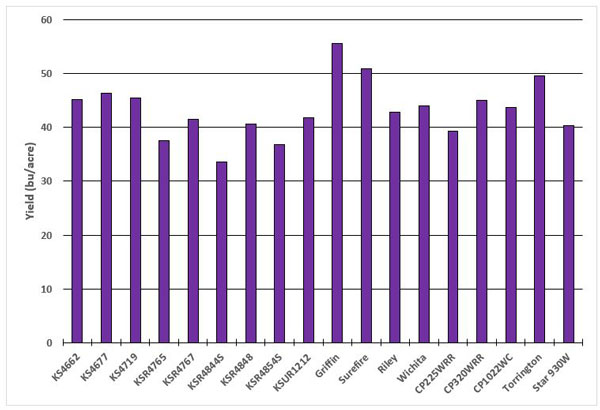
Figure 5. Yield results for southwest Kansas (Garden City) OP variety trials. Garden City LSD (0.05) = 8 bu/acre.
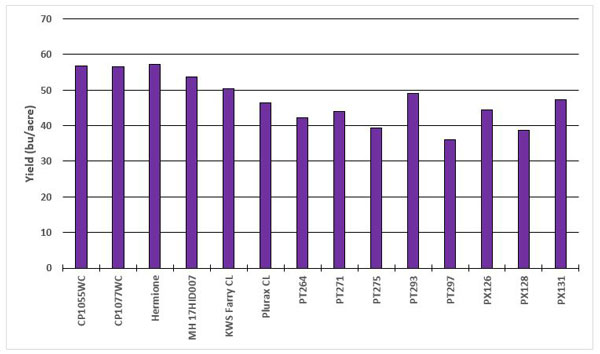
Figure 6. Yield results for southwest Kansas (Garden City) hybrid variety trials. Garden City LSD (0.05) = 6 bu/acre.
Careful variety selection is very important for successful winter canola production. Watch future Agronomy eUpdates for additional trial site results and a discussion to help with variety selection.
Mike Stamm, Canola Breeder
mjstamm@ksu.edu
John Holman, Cropping Systems Agronomist
jholman@ksu.edu
Tags: canola Performance Tests yield results winter canola variety trials